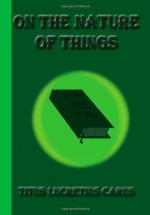|
This section contains 1,538 words (approx. 4 pages at 400 words per page) |

|
In the following essay, Bussey defines Epicureanism and demonstrates how Lucretius upholds its basic tenets.
Lucretius' masterpiece De rerum natura is acknowledged as the preeminent presentation of Epicurean philosophy. How Lucretius came to learn about Epicureanism is uncertain, and there is no evidence of a specific teacher who guided Lucretius' philosophical development. Because Greek professors lectured on the teachings of Epicurus in Rome at the time, however, it is clear that he was well instructed. Epicureanism is based on four central ideas, which are that the gods are not frightening, there is nothing to fear in death, good is accessible, and bad is bearable. Epicurus and his followers formed small communities of like-minded friends who gathered in gardens to study and discuss philosophical issues. Historians note that these communities were especially noteworthy for their surprising inclusion of women and slaves. Studying science and the physical world, Epicurus...
|
This section contains 1,538 words (approx. 4 pages at 400 words per page) |

|




